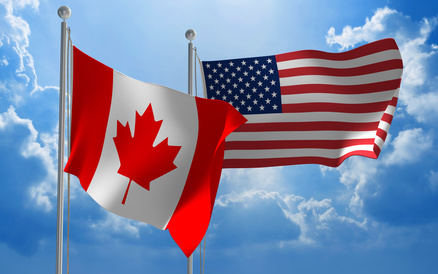Donald Trump’s tax plan threatens Canadian competitiveness

Donald Trump’s surprise victory has Canadian analysts going back to their spreadsheets, calculating the effects of an economic plan that was, just a few days ago, thought to be headed for the dustbin with the candidate’s presumed loss on election night. In particular, his tax plan for business, if applied, will require Canada to adjust or else become less competitive.
As many analysts have already pointed out, the president-elect’s stark climate-change skepticism will make it extremely difficult for Canada to enact a carbon tax.
To do so in this context would actively push corporations and new investments toward the United States and away from Canada.
But Mr. Trump’s tax plan also includes a major change in corporate taxation that will make the United States more attractive: lowering the corporate tax rate to 15 per cent from its current 35 per cent, a substantial drop sure to lure back American businesses that once upon a time set up shop on our side of the border for tax reasons.
Canada’s current federal corporate tax rate is precisely that: 15 per cent.
Former prime minister Jean Chrétien’s government began lowering it in 2000, from an initial rate of 28 per cent, and his successors Paul Martin and Steven Harper followed suit.
Despite the rate’s steady decline, revenues from this tax increased, as taxable income usually changes in response to a change of rate.
Lower corporate income taxes often mean higher revenues for the government. Mr. Trump and his team of economic advisers probably hope to benefit “bigly” from the same effect.
Unfortunately for Canada, on top of the federal corporate tax rate, provinces also levy a corporate tax, whose top rates range from 11 per cent in British Columbia to 16 per cent in Prince Edward Island and Nova Scotia, with most provinces hovering around the 12 per cent mark.
While Nevada, Ohio, Texas and Washington do not levy a corporate income tax, most states do.
It ranges from 4 per cent in North Carolina to 9.4 per cent in Alaska and Washington, with Iowa the sole state outside this range, at 12 per cent.
Looking exclusively at our federal corporate tax rates, Canada has the third-lowest rates among Organization for Economic Co-operation and Development countries, and the United States is dead last.
However, our combined federal and provincial rate places us 23rd among the OECD’s 35 member countries, with the combined U.S. rate still bringing up the rear.
Post-tax cuts, however, the United States would rise to approximately 12th in this ranking.
Another feature of Mr. Trump’s tax plan that might provide further incentives to corporations is a 10-per-cent tax on profit repatriation.
By moving profits abroad, corporations shielded an estimated $2.3-trillion from the American taxman. According to Apple chief executive officer Tim Cook, moving the company’s profits back to the United States would cost 40 per cent at current rates.
Some companies might take advantage of this one-time rebate to also move their operations back.
Deals such as the merger between Burger King and Tim Hortons were engineered, among other reasons, in order to benefit from lower Canadian corporate income taxes and Canada’s more business-friendly rules on corporate repatriation of profits earned overseas. If Mr. Trump’s program is applied, such fiscal advantages would no longer be among the motivations for such a merger.
If Canadian tax rates don’t budge, it will be tempting for corporations to move to the United States, or for new businesses to be created south of the border, leading to a drop in investment and business creation in Canada.
While a Republican Congress will most likely provide a much-needed check against Mr. Trump’s protectionist rhetoric, it’s highly unlikely that it would resist corporate tax cuts.
Canada’s next budgets, federal and provincial, will most likely need to address, and possibly mirror, such cuts.
Mathieu Bédard is Economist at the Montreal Economic Institute. The views reflected in this op-ed are his own.

